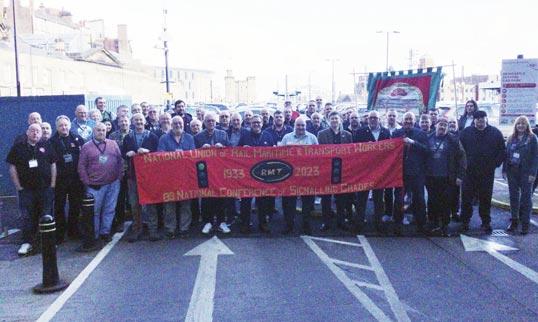
4 minute read
SIGNALLING GRADES MEET Signallers discuss the battle for justice at work, re-grading and safety
The 89th national organising conference for signalling and operations grades meeting in Newcastle last month discussed the fight to defend members wages, terms and conditions.
RMT assistant general secretary Eddie Dempsey said that the government had clearly planned to deal with the cost-of-living crisis by suppressing wages for all workers.
Advertisement
“By taking strike action over the last year RMT members have led the way where other sectors have followed by resisting effective pay cuts,” he said.
He outlined the fact that the union needed to pull together as an all-grades union in order to defend the interests of the membership.
“We have seen a government committed to banning strike action by introducing minimum service levels.
“However, for signal workers you either withdraw your labour or you do not it’s as simple as that,” he said.
He said that the coming battles were about defending the very existence of the union in the rail industry.
“We need to retain our membership in the signalling grades in order to prevent the employers from continually attacking your pay and your terms and conditions.
“We need to stick together and fight together,” he said to a standing ovation.
Steve Shaw of national executive committee said that the union had been through the largest ever consultation of the membership regarding the current national dispute.
He called for members who work for Network Rail to think about standing for the national executive committee in order for your voice to be heard.
Mark Bellenie gave a full report of the work of the National Operations Council including the fact that it had negotiated record numbers of regrading cases which had led to an uplift in wages.
Bob Cross, Stockport and District gave a report of the organising committee focusing on retention and mapping exercises for workers covered by the conference.
“This exercise needs to be carried out in even the most organised areas as well as attending inductions at signalling schools,” he said.
Conference also called for the union to negotiate a payment for training new and promoted signallers in the workplace.
Mark Beresford, Bedlington said that it was not just about money as Network Rail needed to take training seriously.
Steve Loeber, Colchester and District warned that T3 Possessions were being converted at short notice into Line Blockages allowing trains to pass through.
“This practice is putting signal staff under undue pressure and the issue should be raised as a health and safety matter,” he said.
AJ Yates of the National Health and Safety Council reported that there was currently no common process for T3 Possessions and trials were taking place.
Delegates also called for the re-establishment of first aiders in signalling locations.
Paul Kemp, Surrey and Hants warned that first aid training which used to standard was now nonexistent.
“I remember taking the training course years ago not thinking I would need it, however, I was called upon to give assistance just last year and it could well have saved a life,” he said.
Happy Retirement To Mick Knox

Conference wished Mick Knox a happy retirement after leaving the industry. He was dismissed in February 2022 and the union has been fighting for justice for him including strike action. His colleagues at Didcot TVSC held two days of strike action last November and a tribunal date has been set for November 2024.
Mick started work in 1995 at St James Deeping on the Peterborough to Spalding line and subsequently worked around the country in various grades.
“I am proud of my record and as I joined after the 1994 dispute and before the current dispute my own battle was the only strike I was involved in,” he said.
Paul Kemp Leaves The Stage
Paul Kemp, who has been a well-known face at the signallers conference for many years, has decided to retire from the railway in May after 43 years’ service to the industry and the union.
Paul started work as a ‘Signal Box lad’ at Gloucester Road junction in 1980 and said that the industry had changed beyond all recognition since then.
He has served as a union rep for 41 years and represented a countless number of NUR/RMT members.
“I always enjoyed serving as a trade union rep and I often wonder where the years went.
“Although this is my last conference as a delegate I will be back as a proud retired member.
“I would also encourage signallers and operations workers young and old to come to conference and share their experiences,” he said.
Newcastle Stalwart
A stalwart of the Newcastle Rail and Catering branch, signaller Alan Rogerson announced his retirement from the industry at conference.
He joined the industry in January 1976 as a crossing keeper at Peth Lane before becoming a signal worker. He has served the union in many roles including branch secretary and attended every signalling grades conference since 1984.
“I have enjoyed my trade union career and I could not have done it without the support of my wife Lynn.
“I know the union is in good hands and I wish you all the best for the future,” he said.
New National Operations Council
A new Network Rail National Operations Council has been elected for three years to represent signallers within the company. The council includes Ian McKellar representing Scotland and Matt Bentley, Janna Jensen and Mark Bellenie representing England and Wales.
Their role includes organising rep structures and dispute resolution forums from local through to national level. There are also discussions on automated signalling, workstation sizing, collective bargaining and the development of a PTRR guide for re-signalling schemes.
Mark Bellenie said that it was a very varied role.
“We interact with many different disciplines from signallers and supervisors through to timetable planners and administrators.
“We also deal with complex welfare, disciplinary and grievance cases where we deal with traumatised members who need support,” he said.







